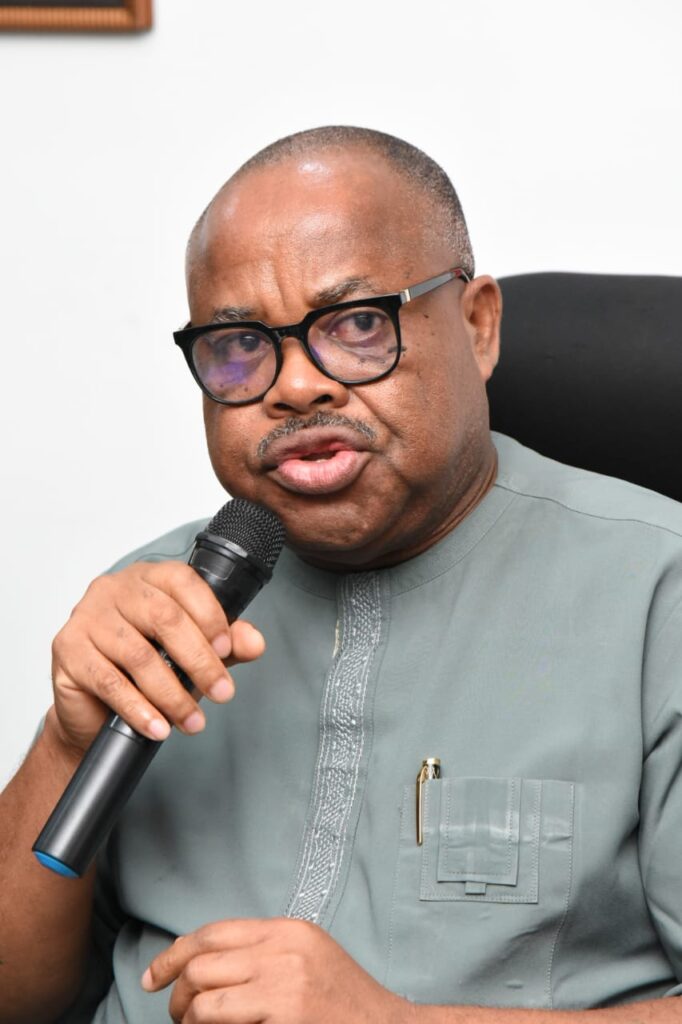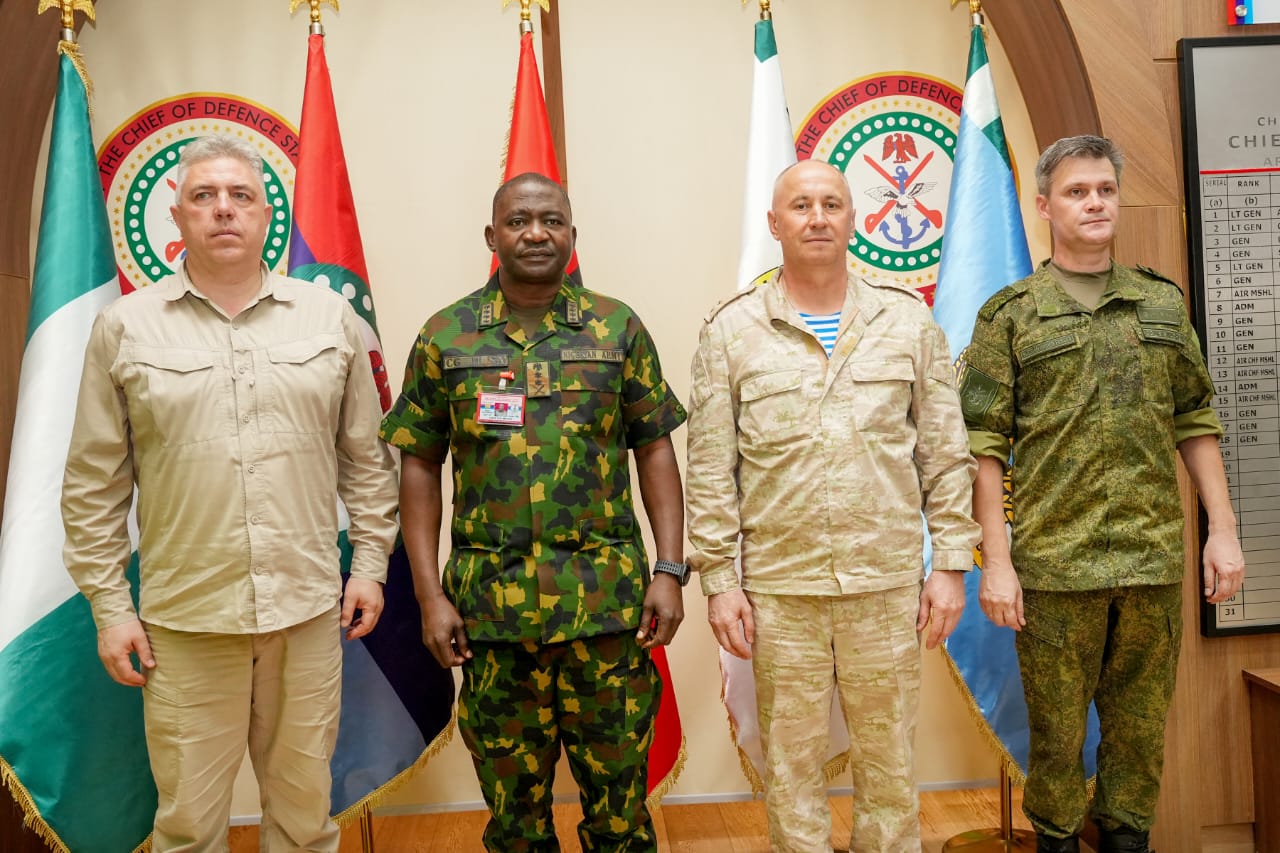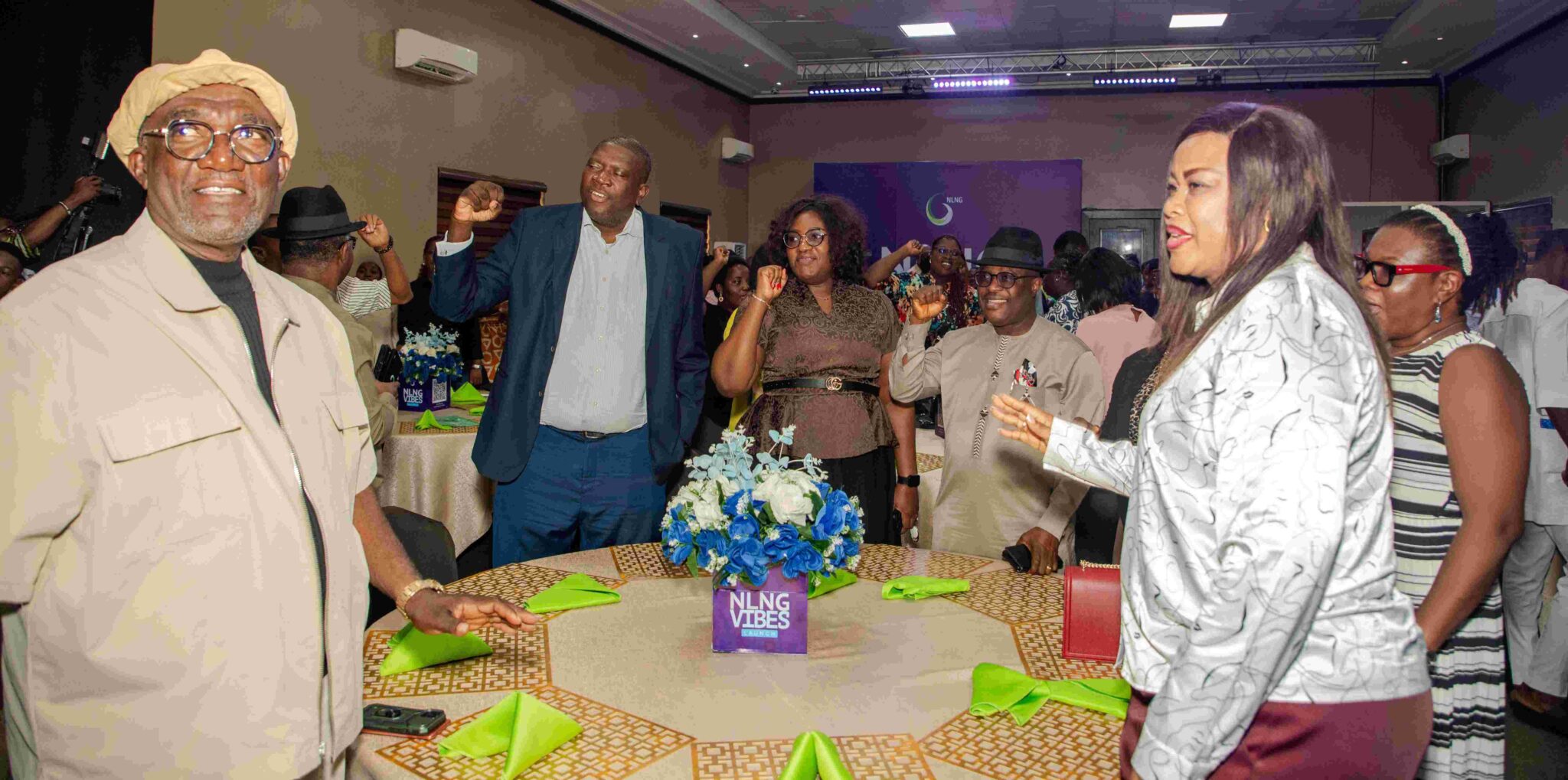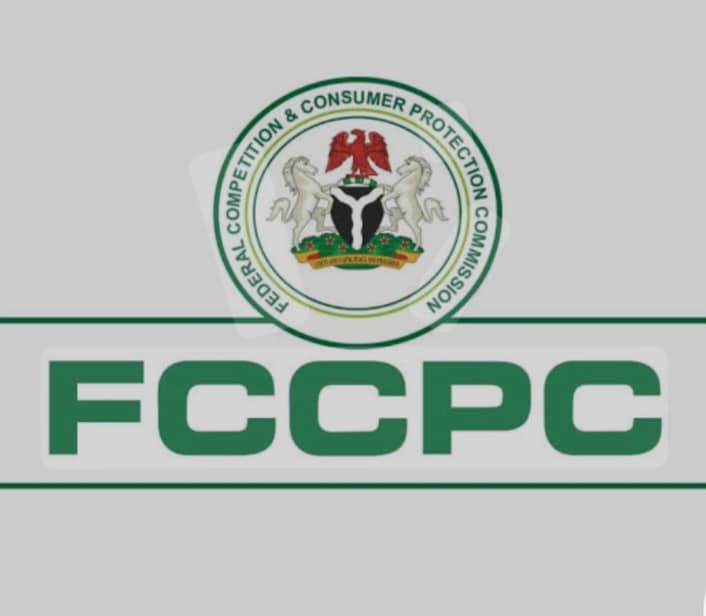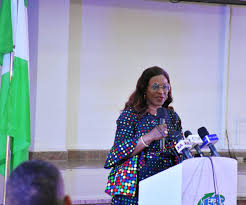Russia willing to share counter-terrorism strategies with Nigeria —Envoy
By Sumaila Ogbaje
The Russian Government has expressed willingness to share with Nigeria the new strategies it has developed to support the country’s fight against terrorism.
Nigeria’s Director of Defence Information, Brig.-Gen. Tukur Gusau, made this known in Abuja.
He said Lt.-Gen. Andrei Averianov, Russian envoy, made the pledge when he paid a courtesy visit to the Chief of Defence Staff (CDS), Gen. Christopher Musa in Abuja.
Gusau said that Averianov said Russia was engaged in special operations in 39 countries, during which it developed new methods, and was willing to share them with Nigeria to support the fight against terrorism.
He said it had been 80 years since Russia fought Nazism, adding that the security landscape had however, evolved, with asymmetric threats such as Al-Qaeda and Boko Haram now emerging.
Gusau said the head of the Russian delegation expressed Russia’s delight for being part of the fight to create a more secure environment for future generations in Nigeria.
He pledged Russia’s support to Nigeria in its fight against terrorism, while recognising Nigeria’s significance as a major stakeholder and power in the region.
According to him, Russia has been observing and learning from Nigeria’s counterterrorism efforts over the years, Gusau attributed the envoy as saying.
“As brothers in arms, we are ready to assist, particularly with the provision of the full range of weapons required by the Armed Forces of Nigeria (AFN) to prosecute its war on terror,” he said.
Gusau said that responding, the CDS welcomed the delegation on behalf of President Bola Tinubu and the members of the Nigerian military.
Musa said that both Russia and Nigeria were undergoing challenging times, resulting in the loss of personnel and necessitating the conduct of special operations.
According to him, Musa thanked the delegation for the support from the Russian Federation.
Musa, he said, noted that Russia and Nigeria had long enjoyed strong ties, emphasising the need for continued partnerships in the areas of training and operations.
The CDS further emphasised the importance of exchanging instructors and students between the two countries for trainings.
“For the Nigerian Army, Navy and Air Force, there is the need to expand training in Special Operations and provision of requisite equipment, special boats, fast attack craft and amphibious training.
“Others include the need for assistance in the maintenance of Russian platforms and the provision of air surveillance, respectively,” he said.
Gusau further quoted the defence chief as stressing that Nigeria had several Russian-made platforms that were currently unserviceable.
He requested support through the provision of spare parts and the deployment of Russian experts for in-country maintenance or arrangements for backloading such equipment to Russia for repairs.
Musa appealed for enhanced intelligence sharing from Russia to Nigeria, noting that the Russians had gained valuable experience and capacity from their extended operations, particularly in the Sahel region.
He said that Musa also thanked the delegation for their gesture for personally delivering equipment and providing a team of experts to assist in their testing.
The CDS added that the Russian Federation had fulfilled its commitment to Nigeria as promised,” Gusau said. (NAN)(www.nannews.ng)
Editted by Abdulfatai Beki/Mark Longyen
Political parties should not be business ventures – Speaker
By Emmanuel Oloniruha
The Speaker, House of representatives, Tajudeen Abbas, says Nigerians must find ways to make political parties fulfil their objectives and not turned to business ventures by their managers.
Abbas said this in Abuja, in his keynote address at a technical workshop on Political Parties Bill for House Committee on Political Party Matters.
The News Agency of Nigeria (NAN) reports that the workshop organised by YIAGA Africa and the Kukah Centre, was supported by the European Union Support to Democratic Governance in Nigeria (EU-SDGN).
Abbas, represented by Mr Ishaya Lalu, said even though Nigeria practiced the same presidential system as the US, the registration and regulation of political funding made a huge difference between them.
“In the USA, the Federal Election Commission (FEC) regulates campaign finance and oversees aspects of party registration.
“In the United Kingdom, the Electoral Commission oversees party registration, campaign finance, and the electoral process.
“Sweden also has a well-established agency for party registration and party finance regulations,” he said.
According to him, the Independent Electoral Commission (INEC) has the power to register political parties and conduct elections, but there is a need to do beyond this.
“For instance, some political party funding in Nigeria is taken over by wealthy individuals as investments were made, either as businessmen or politicians to hijack the political parties and impose candidates on the parties during the electoral process,” he said.
The speaker noted that the political parties lacked principle or ideology, compared to their contemporary in advanced democracy.
Abbas also said people who believe in the ideology of political parties had no reason to run from one party to another.
“In developed democracies, such as the United States of America, India, Canada, Germany, and the United Kingdom, members of political parties were known for their steadfastness in promoting the principles and ideologies of their parties,’’ he said.
He noted that in the United Kingdom, the Conservative Party, founded in 1834, had continued to advance the party’s ideology over the centuries, “even when it is out of power.’
“However, in Nigeria, the reverse is the case,’’ he said.
The speaker noted that the Political Parties Bill presently before the National Assembly, would promote party independency and public trust in political parties.
“The bill is seeking for an Act to provide for the establishment of an independent authority for the registration, regulation and funding of political parties in Nigeria and related matters.
“The bill would promote transparency and accountability, separate the regulatory function from government control.
“The bill, when passed into law, would domicile party regulation in an independent body that would not be partisan in holding political parties accountable for things like campaign financing and the sources.
“It is expected to promote public trust in party system and improve governance as the people will become reasonable funders and tackle corruption,’’ he said.
Chairman, House Committee on Political Matters, Zakari Nyampa, said that the bill was key as it looked into regulating the political party, the funding, accountability and transparency.
Nyampa expressed confidence that the bill, sponsored by the Speaker of House of Representatives, would secure the needed support.
“As the country is trying to improve on democracy, this bill is very important, as well as the workshop,’’ Nyampa said. (NAN)(www.nannews.ng)
Edited by Maureen Atuonwu
NLNG initiates new empowerment scheme for host communities
By Desmond Ejibas
The Nigerian Liquefied Natural Gas (NLNG) has announced the launch of the Vocational, Innovation, Business, and Empowerment Scheme (VIBES) for its more than 110 host and pipeline communities in Rivers.
Dr Sophia Horsfall, General Manager of External Relations and Sustainable Development at NLNG, made the remark during the inauguration of the economic empowerment programme in Port Harcourt.
Horsfall, represented by Mr Charles Epelle, Manager of Community Relations and Sustainable Development, stated that VIBES would replace the Youth Empowerment Scheme (YES), which had been operational since 2004.
She explained that VIBES was established to foster entrepreneurial knowledge and networks essential for the development of entrepreneurs and change-makers within Rivers communities.
“NLNG believes that entrepreneurship is not merely about starting and running businesses but creating opportunities that drive economic growth and positive social change in our host communities.
“We are confident that VIBES will foster an environment in which individuals can establish businesses, generate employment, and emerge as innovators.
“This belief underpins our commitment to nurturing local capacity and enabling individuals to become creators of jobs, wealth, and lasting impact,” she said.
Horsfall noted that the previous scheme had trained over 1,400 youths across 10 different empowerment programmes over the past 21 years.
The programmes include automotive engineering, advanced welding, catering and hotel management, fashion design and cosmetology, farm management, information and communication technology, as well as photography and video production.
She added that NLNG had assembled industry experts in entrepreneurship, business development, law, technology and innovation, and several other fields to continue the training and mentoring of selected business operators.
According to Horsfall, the model will ensure their continued survival, growth, and sustainability of the businesses.
“Beneficiaries will undergo professional, practical, and participatory training designed to build robust technical and managerial capacities.
“The top 50 participants will each receive a grant of 1,300 dollars (about N2.91 million), disbursed in two tranches.
“This funding is intended to assist in scaling up their businesses, supported by a broader system of mentorship, networking opportunities, and additional services,” she added.
The NLNG General Manager also stated that the company would provide comprehensive business training, covering financial management, marketing, strategic planning, legal practices, and other essential areas.
Horsfall, however, expressed regret that only about 300 of the 1,400 individuals trained under the discontinued YES scheme had established and were operating viable business to date. (NAN) (www.nannews.ng)
Edited by Jane-Frances Oraka
NDA inaugurates Queen Amina statute, other projects
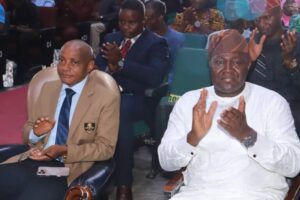
Seplat Energy declares 4.6 U.S. cents interim dividend, records N35.4bn profit
By Taiye Olayemi
Seplat Energy, an independent energy company dual-listed on the Nigerian Exchange Ltd. and the London Stock Exchange, has announced an interim dividend of 4.6 U.S. cents per ordinary share, subject to applicable withholding tax.
The company disclosed this through a corporate disclosure through the Nigerian Exchange Ltd. on Monday.
The dividend is to be paid to Seplat Energy’s shareholders whose names appear in the register of members as at the close of business on May 23.
“The disclosure reads “An Interim dividend of US 4.6 cents per ordinary share of N0.50k each, subject to appropriate withholding tax will be paid to shareholders whose names appear in the register of members as at the close of business on May 23, 2025.
“The interim dividend will be paid on or around June 6, 2025, electronically to shareholders whose names appear on the Register of Members as of May 23, 2025.
“It will be paid to those who have completed the e-dividend registration and mandated the Registrar to pay their interim dividend directly into their bank accounts.”
Roger Brown, Chief Executive Officer of Seplat Energy, said the year 2025 started positively for Seplat as the company delivered the business at a significantly enhanced scale.
He said, “I am pleased to report that we are making good progress. It is clear that we can benefit greatly from the combined expertise of our onshore and offshore workforce.
“Production has been strong, showing the benefit of the continuous drilling programme, investment in asset, integrity and the availability of multiple evacuation routes.
“Financial performance was also strong, allowing us to be pro-active in materially reducing gross debt, maintaining low balance sheet leverage, and further strengthening our company as the near term global economic outlook becomes less predictable.
“We remain conservative in our approach, but our confidence in the future trajectory for our business, combined with our strong financial position, means that we are delighted to increase our quarterly dividend to $4.6c/share, 28 per cent increase in our quarterly dividend versus the fourth quarter of 2024.”
Seplat Energy recorded N35.4 billion profit for the first quarter of 2025 as against N2.9 billion reported within the same period under review in 2024.
The company’s revenue soared to N1.227 trillion from N268.6 billion in first quarter of 2024.
The EBITDA also rose from N184.2 billion in 2024 first quarter to N607.6 billion in 2025. (NAN) (www.nannews.ng)
Edited by Olawunmi Ashafa
SEC advocates collaboration among African markets
By Taiye Olayemi
Director-General of the Securities and Exchange Commission (SEC), Dr Emomotimi Agama, has called for enhanced collaboration among African markets for a stronger interconnection within the continent as well as development of new products.
In a statement on Monday in Lagos, Agama,was said to have made the call during a visit of the Board of the SEC to the Autorite Marocaine Du Marche Des Capitaux , AMMC (Moroccan Capital Market Authority) in Rabat.
“We need to cooperate in Africa, invest in each other’s market and grow our continent. We want to build collaboration so that as Africans we can have a focus and build a strong interconnection. The time is now for us to look inwards.
“We are aware of your strength in Collective Investment Schemes and we know we can learn a lot from you. The population of Nigeria is huge and we need people to understand the huge benefits in CIS and how they can key into it.
“We appreciate the strength of the Moroccan economy and structure and we want to see what role the capital market has played in all of this,” he said.
Agama noted that the capital market is the nerve centre of the economy, adding that the citizens need to understand how to use it to create wealth to improve their quality of life.
He said, “The capital market is an enabler to the development of the economy and we believe there is so much to learn from Morocco to help strengthen our own market.
“We are excited about what the future holds for us and how we can forge a common front.
“We are happy about the progress of CIS in Morocco and we want to learn from you and also tell you about or experience because there is a lot to gain.
“Our relationship and Integration will go a long way in building both markets and make life better for our citizens. We encourage government to use long-term capital for long-term projects.
“The capital market is the solution to raising funds for long term infrastructure development.
“We see the capital market as a solution provider to move the economy forward. We want to make Africa better and a destination of choice. We want to jointly work with other regulators to achieve it.”
In her remarks, Chairperson of Moroccan Capital Market Authority, Ms Nezha Hayat, expressed her delight at the relationship between the two regulators.
Hayat said that the capital market had evolved and people would rather invest in the capital market.
She noted, “Capital market has now diversified so much, but for us everything goes through mutual funds.
“We think CIS is very important because people put their money in funds that are regulated and are controlled. People have more access through CIS. It is key to encourage the truth of any market.
“I believe in an integrated market so cooperation is better. We are interested in dual listing; we will soon be authorising funds in foreign currency which means the mutual funds can also be invested in foreign countries.
“We have a special focus on Nigeria, which will be one of the markets where this will happen. We need to deploy initiatives that will focus on developing our continent.”
Also speaking, Chairman of the SEC Nigeria Board, Mr Mairiga Katuka, said the commision was interested in learning from other jurisdictions to make the capital market in Nigeria work better. (NAN) (www.nannews.ng)
Edited by Olawunmi Ashafa
FCCPC launches forum in Sango-Ota to address IBEDC consumer grievances
By Ige Adekunle
The Federal Competition and Consumer Protection Commission (FCCPC) has launched an intervention in Sango-Ota, Ogun, convening a three-day electricity consumer forum to address the grievances of residents against the Ibadan Electricity Distribution Company (IBEDC).
The forum is in response to complaints which include allegations of negligence and a situation where communities were reportedly funding their own electricity infrastructure while still facing exorbitant bills.
Its Executive Vice Chairman, Mr Tunji Bello, during the forum on Monday, reiterated the FCCPC’s commitment to providing effective consumer protection.
The News Agency of Nigeria (NAN) reports that the three-day forum was organised by the FCCPC in collaboration with the Sango/Ita Community Development Committee (SACDC).
Bello, represented by Mrs Bridget Etim, a director from the FCCPC, said, “The Ibadan Electricity Distribution Company (IBEDC) will be present to address complaints directly.
“This initiative aligns with our mandate to make consumer protection practical, accessible, and effective.”
He urged residents to utilise the forum to report service-related grievances through the appropriate channels for timely resolution.
Bello said the forum was designed to close the communication gap between consumers and service providers in the electricity sector.
“Electricity is not just a commodity; it is a vital service that powers livelihoods, businesses, and economic progress,” he said.
The FCCPC’s Chief Executive Officer acknowledged ongoing challenges in the sector, which include poor metering, inaccurate billing, and infrastructure deficits.
“The Ibadan Electricity Distribution Company (IBEDC) will be present to address complaints directly. This initiative aligns with our mandate to make consumer protection practical, accessible, and effective,” he added.
Bello reaffirmed the FCCPC’s commitment to educating consumers on their rights and facilitating complaint resolution, while promoting fair practices among service providers.
Meanwhile, Mr Francis Agoha, Chief Executive Officer of IBEDC, described the forum as timely, noting that it would help resolve long-standing disputes between the company and consumers.
Agoha, represented by Mr Abdulrasaq Jimoh, Regional Manager, Abeokuta Region, emphasised that many consumers fail to follow proper procedures when they invest in electricity infrastructure such as transformers and meters.
According to him, while communities are encouraged to invest, there are regulatory guidelines that must be followed to ensure their investments are recoverable.
“When consumers or communities purchase transformers or pay for meters, there is a legal process that requires documentation and regulatory approval.
“Immediate refunds are not made in cash but are compensated through energy credits over time,” Agoha stated.
He noted that some communities erect transformers without consulting the necessary regulatory authorities, which not only breaches regulations but also exposes residents to serious safety risks.
“Installing a transformer requires licensed electrical contractors and regulatory oversight from bodies like NEMSA.
“Communities must inform both the regulators and the Disco before any installations,” he warned.
Addressing concerns that some communities feel compelled to self-fund electricity projects because of perceived delays or financial constraints on the part of IBEDC, Agoha clarified: “We do not officially instruct consumers to buy transformers or meters.
“However, where they choose to invest, they must engage the right procedures to ensure safety and proper reimbursement.”
He further explained that energy theft remains a major challenge for distribution companies, affecting their ability to recover costs and provide reliable services.
“Only about 40 to 60 per cent of distributed energy is recovered financially due to rampant electricity theft.
“Unfortunately, many consumers believe they should not pay for electricity even after using it,” he lamented.
On billing disputes, Agoha encouraged residents to escalate complaints properly.
“If consumers are billed unfairly or receive poor service, they should report to the FCCPC or NERC. Valid complaints backed with evidence lead to refunds in the form of energy credits,” he assured.
He cited the recent downgrade of the Sango Feeder from Band A to Band C due to unstable power supply, adding that affected consumers who had prepaid for higher service bands would be compensated accordingly.
Also, Mr Olatunji Onaolapo, Zonal Chairman of the Ado-Odo/Ota Community Development Committee, said the forum offered a platform to escalate persistent complaints about IBEDC’s services.
He lamented that in spite of multiple meetings with the company’s management, issues remained unresolved.
“We turned to the FCCPC after exhausting all efforts with IBEDC.
“Communities are forced to purchase their own wires, transformers, and poles, yet are burdened with exorbitant bills,” Onaolapo said.
He urged IBEDC to provide prepaid meters and eliminate estimated billing, stressing that fairer practices would restore consumer confidence. (NAN) (www.nannews.ng)
Edited by Olawunmi Ashafa
Association chairman hails 3 referees for ITF white badge tennis certifications
By Victor Okoye
Efe Okwagbe, Chairman of the Nigeria Tennis Umpires Association (NTUA), has commended three Nigerian referees for successfully bagging the International Tennis Federation (ITF) certification as White Badge Tennis Referees.
The News Agency of Nigeria (NAN) reports that the trio of Joseph Edili, Bitrus Danjuma, and Folashade Ogunshola achieved the feat on Sunday in Abidjan, Cote d’Ivoire.
This was after a rigorous and highly competitive selection process by the ITF selection panel and their outstanding performance at the officiating school held from April 23 to April 27.
Okwagbe commended the officials for doing Nigeria Tennis Federation as well as the Association proud with their impressive outing at the school.
“This laudable achievement is a true testament of hard work, dedication, and commitment to officiating duties, especially in the area of the interpretation of tennis rules by the three officials.
“Now, with their ITF certification, the referees are qualified to officiate at international tennis tournaments and represent the country anywhere in the world.
“This cheering news is also coming at a time when the country is without any ITF certified tennis referee.
“This was after the demise of the late Arinola Banire and Henry Ubochi, whom before their deaths were the only ITF certified tennis referees in Nigeria,” he said.
He said that his leadership and the NTUA’s initiatives have contributed significantly to promoting a high standard tennis officiating in Nigeria.
The NTUA boss added that the association, under his watch, would continue to work towards developing skilled and certified umpires who can excel globally.(NAN)(www.nannews.ng)
Edited by Joseph Edeh
Nigeria’s 1st quarter non-oil export values at $1.791bn -D-G NEPC
By Vivian Emoni
The Nigeria Export Promotion Council (NEPC) says the country’s non-oil products exported in the first quarter of 2025 were valued at 1.791 billion dollars.
Dr Nonye Ayeni, Director-General of the NEPC said this on Monday in Abuja while presenting a First Quarter Progress Report on the Non-Oil Export Performance for the year 2025.
Ayeni said that the figure showed a 24.75 per cent increase above the 1.436 billion dollars reported in the first quarter of 2024.
She said that the volume also increased to 2.416 million metric tonnes which was an increase of 243.44 per cent from 1.937 million metric tons recorded in the first quarter of 2024.
“In the first quarter of 2025, a total of 197 distinct products were exported.
“This figure reflects an increase when compared to the 162 products recorded in the first quarter of 2024.
“These products range from manufactured and semi-processed goods to industrial extracts and agricultural commodities,” she said.
Ayeni recalled that in January, the NEPC reported the highest value of non-oil export since 49 years of its establishment.
According to her, this is with a year-on-year increase of 20.77 per cent from 4.517 billion dollars in 2023 to 5.456 billion dollars in 2024.
She said that out of the top 20 leading export companies, Indorama Eleme Fertiliser and Chemical Ltd and Starlink Global and Ideal Ltd, maintained their position as first and second.
She said that the two companies recorded 12.07 per cent and 10.00 per cent respectively.
According to her, this is attributed to their notable export values of fertiliser and cocoa products.
The director-general said that of the top-20 products exported in the first quarter of 2025, cocoa and its derivatives including cocoa butter, cocoa liquor, cocoa cake came first.
Ayeni said that Urea, Cashew Nut, Sesame Seed, Gold Dore, Cocoa Butter, Aluminium Ingots, Copper Ingot, Soya Beans/Meal, Rubber were the top of the list.
According to her, this is based on information by Pre-shipment Inspection Agents (PIAs).
She said that the top commodity in terms of total non-oil export, accounting for 45.02 per cent was cocoa beans.
She said that urea/fertiliser held second position at 19.32 per cent while cashew nuts came third with 5.81 per cent of the total exported products.
“The council is working with the Ministry of Industry, Trade and Investment and other stakeholders toward increasing the volume and value of non-oil exports.
The efforts are aligned with President Bola Tinubu’s Renewed Hope Agenda,” she said.
She also said that 10 member countries of ECOWAS actively engaged in importing Nigerian products throughout the First Quarter of 2025.
“These exports, amounting to 63.060 million dollars, constituted 3.52 per cent of the total export value.
“This is also a significant increase of 223.10 per cent when compared to the recorded figure of 19.517 million dollars for the first quarter of the year 2024.
“Nigeria also exported to other African countries in the first quarter of 2025.
“The value of these exports, totalling 32.732 million dollars, represented 1.83 per cent of the total export value,” Ayeni said.
She said that the non-oil exports were increasing, adding that all stakeholders are taking advantage of the potentials and opportunities inherent in the sector. (NAN)(www.nannews.ng)
Edited by Kadiri Abdulrahman




